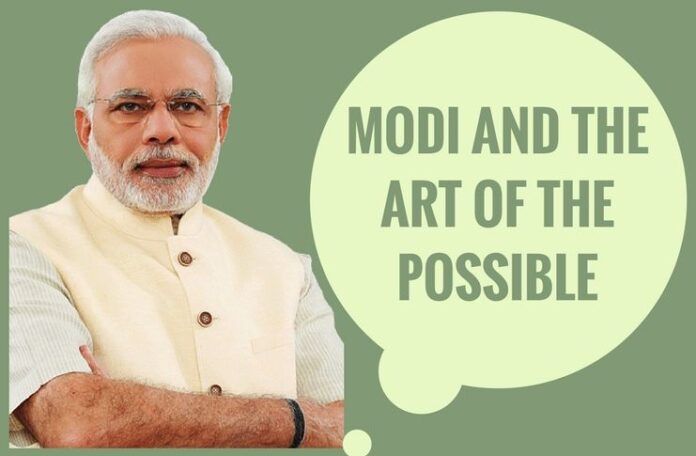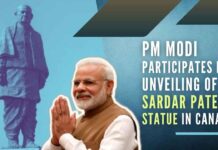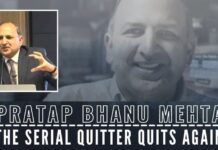
PM Narendra Modi believes in the art of the impossible
[dropcap color=”#008040″ boxed=”yes” boxed_radius=”8px” class=”” id=””]P[/dropcap]olitics, said Bismarck, is the art of the possible. That was then. But, in the era of the modern welfare state, politics is largely the art of the impossible, the American thinker Thomas Sowell wrote a few years ago. More than anywhere else, it is truer in India; and more than anybody else, Prime Minister Narendra Modi believes in the art of the impossible.
It is impossible to improve India’s ranking in the World Bank’s ease of doing business index by letting regulators, government functionaries, and judicial and quasi-judicial bodies running berserk
It is impossible to attract big investment with a statist mindset, an interventionist bureaucracy, opaque rules and regulations, maximalist taxation, and impulsive decision making. But Modi thinks that it is possible.
It is impossible to improve India’s ranking in the World Bank’s ease of doing business index by letting regulators, government functionaries, and judicial and quasi-judicial bodies running berserk. But Modi believes all such entities don’t matter; only his good intentions do.
[dropcap color=”#008040″ boxed=”yes” boxed_radius=”8px” class=”” id=””]N[/dropcap]ow whatever else one may say about him, nobody can doubt his good intentions, as also his personal integrity. But the problem is that good intention don’t automatically translate into desired results. Well, God can create anything ex nihilo, out of nothing, just by saying so. He said, ‘Let there be light,’ and there was light. Similarly, when Lord Shiva is pleased with a worshipper and wants to bless him, he just has to say ‘Tathastu,’ and his wishes come true. But, unfortunately, Modi is not a god, despite his devotees’ belief to the contrary. So, his good intentions and commands don’t get divinely translated into reality. He says, Make in India, but it doesn’t happen because he is human; and humans have to follow a certain path and adopt a specified procedure to achieve any desired result.
According to a report in The Indian Express (June 4), “a National Anti-profiteering Authority with powers to summon a person whose attendance is considered necessary, in line with judicial proceedings, has been suggested.”
For instance, if you want to have the physique of a model or a filmstar, you have to change your lifestyle. You can’t have poori in breakfast, paranthas and oily curries for lunch, samosas as evening snacks, and butter-chicken in dinner every day, you can’t smoke heavily and drink daily, you can’t live a sedentary life—and hope to look like Hrithik Roshan or Shilpa Shetty. A school student cannot afford to bunk classes regularly, spend all his or her time on mobile and movies—and expect to do well academically.
Similarly, the chief political executive of a country cannot persist with socialist policies, make sudden announcements impacting the entire country’s economy and daily life, and introduce greater state intervention in the economy—and hope to attract investment, trigger brisker economic activity, and help generate jobs.
[dropcap color=”#008040″ boxed=”yes” boxed_radius=”8px” class=”” id=””]T[/dropcap]he Modi government has done little to initiate big reforms, and it is doing much more than a little to augment control over the economy. After bringing in price controls in the health sector, it is determined to institute an ‘anti-profiteering authority’ as part and parcel of the goods and service tax (GST) regime. According to a report in The Indian Express (June 4), “a National Anti-profiteering Authority with powers to summon a person whose attendance is considered necessary, in line with judicial proceedings, has been suggested.”
When it determines that a registered person has not passed on the reduction in tax rate or input tax credit benefit to the recipient, Authority shall be authorized to recommend a reduction in prices, return of the amount equivalent to the amount not passed to the recipient and recovery of the amount including the interest recommended to be returned and deposited in the Consumer Welfare Fund, as provided under Section 57 of CGST Act, the IE report says.
In other words, there would be another set of bureaucrats who would breathe down the neck of businesspersons. The officials who have never done any business would tell industrialists what should be the price of the goods they produce. How would they do that? Nobody knows. When does profit become ‘profiteering’? Nobody knows. Which consumer would benefit from the so-called Consumer Welfare Fund? Nobody knows.
But what we know is that the netas and babus will get another stick to beat manufacturers and service providers with. They will make the lives of businesspersons miserable; they will make doing business much more difficult, cumbersome, and tortuous.
And yet Modi hopes to increase India’s rank in the World Bank’s ease of doing a business index. He clearly believes in the art of the impossible.
Note:
1.The views expressed here are those of the author and do not necessarily represent or reflect the views of PGurus.
- Liberty Is Penalized, Violence Goes Untouched - December 21, 2019
- Rahul’s Howdy bloomer - September 22, 2019
- Chidambaram’s hypocrisy - August 22, 2019











Modi-Sarkar in reality is a mere make-believe Sarkar. But i would say atleast something is better than nothin and compared to UPA things are better. Also luck favours Modi regime in form of well cooled crude oil prices which acts as a cushion for Govt to focus on other reforms.
The criticms in this article are broadly objective and fair. The core of the criticisms is: How can a right-of-centre party run the Government as a left-of-centre one?
Modi’s dilemma is this: Having come to power with the support of all sections, incl the poor and the marginalised, how can he not balance his acts so everyone believes Modi is for him/ her also? After all, most rightist measures will take a long time to start showing results.
There’s a dearth of political and administrative rightist talent that can help Modi do the balancing act better. And those who can help him do this don’t have mass base and are not part of the team that helped him come to power, and can’t be relied on to sustain him in power.
So, even if the results are sub-optimal, the current model helps him retain his popular support (and in fact, helps him increase it in the immediate and short term).
This is realpolitik.